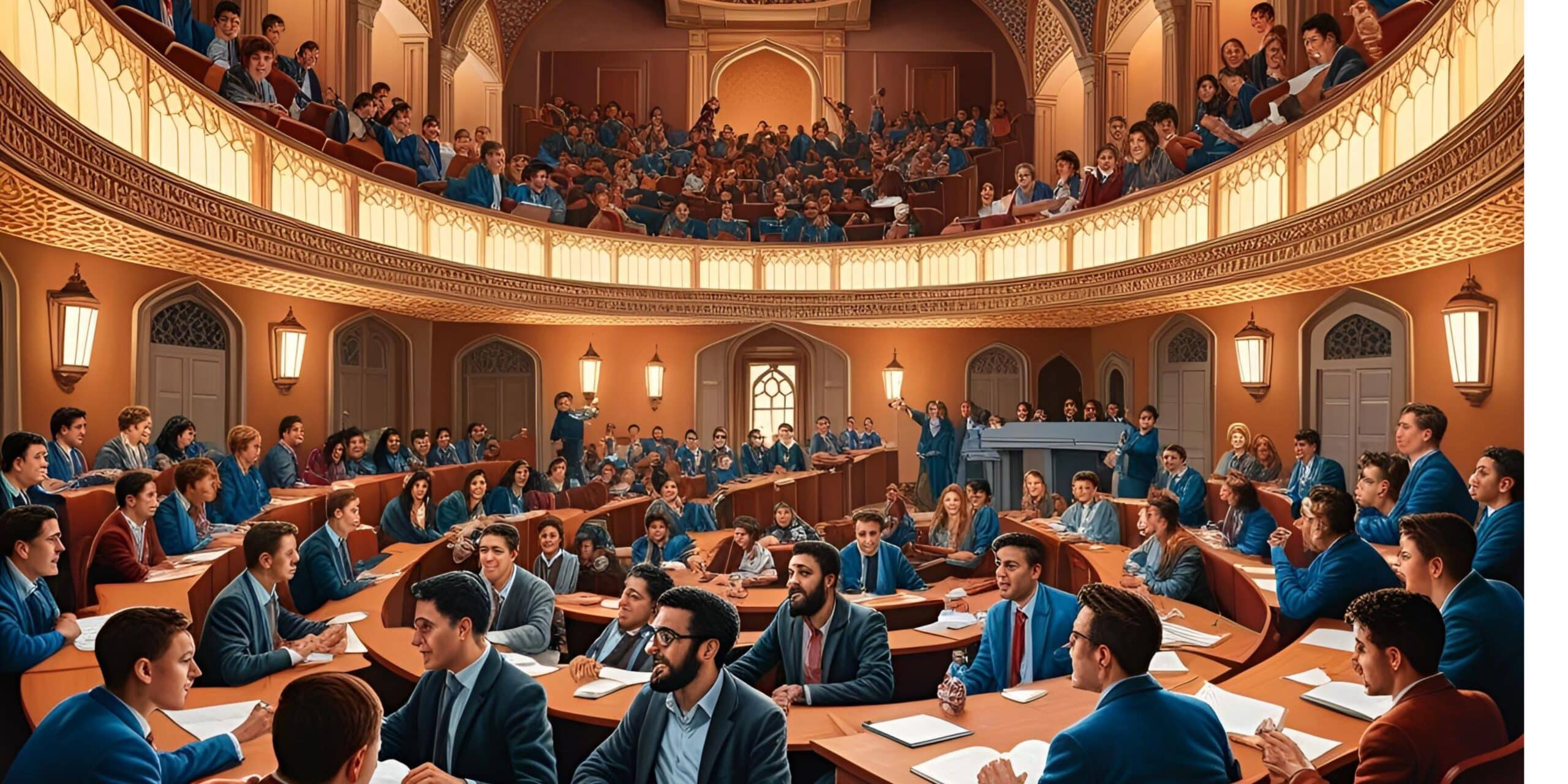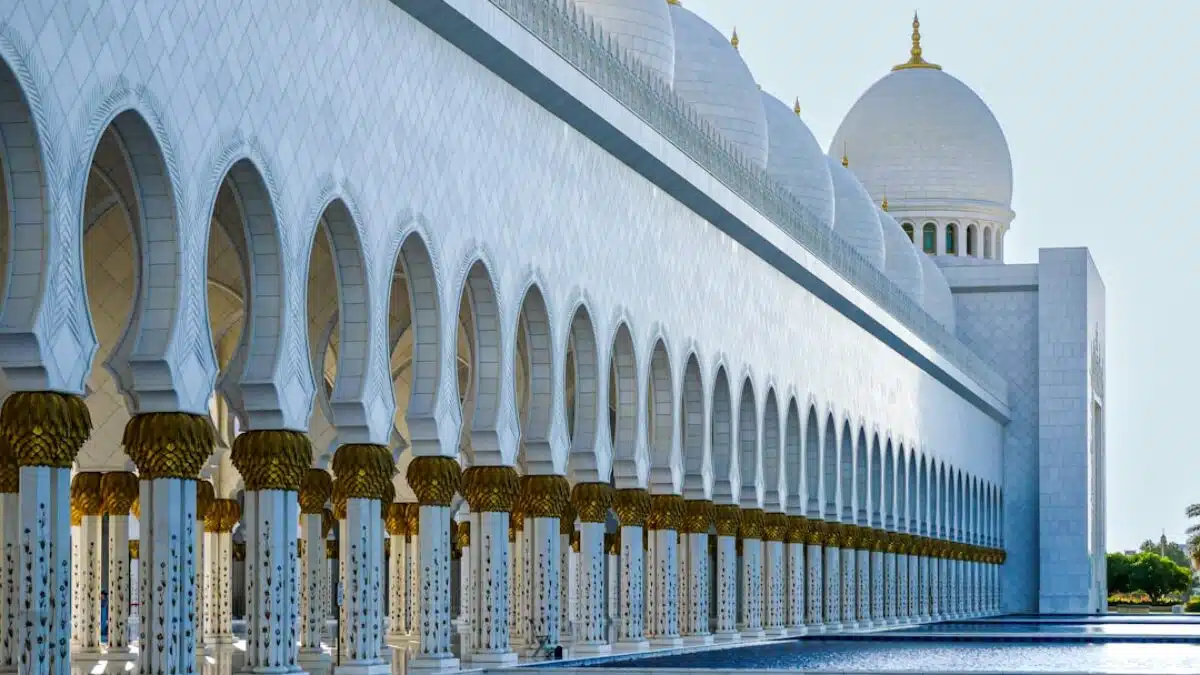Islamic scholarship in the United Kingdom is more than a field of study. It is a lively mix of history, culture, politics, and intellectual growth. Beneath its academic surface are stories of perseverance, innovation, and debate. These stories have shaped how Islam is viewed today. This article explores these hidden narratives, looking at the past, present, and future of Islamic scholarship in the UK. It uncovers the struggles for academic freedom and how Islamic thought is taught in British universities.Introduction

In the UK, Islamic studies hold a unique place in today’s academic world. It has a rich history of intellectual pursuit that spans centuries. However, modern challenges and political sensitivities have changed the field significantly. Many may not know that studying Islam in the UK involves more than just lectures and papers. It includes hidden histories, personal stories of scholars, and internal debates that often stay within academic circles. This article reveals these lesser-known aspects. It aims to offer a clear view of the evolution, challenges, and future of Islamic scholarship in the United Kingdom.Historical Foundations of Islamic Scholarship in the UK
Early Encounters and Colonial Influences
From the early days of the British Empire, scholars and administrators found themselves encountering the complexities of Muslim cultures and religious texts. The British interest in Islam was not purely academic; it was intertwined with governance, diplomacy, and the need to understand regions under imperial influence. Early scholars meticulously recorded, translated, and interpreted Islamic manuscripts, laying the groundwork for academic inquiry. Their work, though often colored by the biases of the era, provided the first systematic approach to understanding Islamic civilization.
Establishment of Academic Institutions
As the discipline matured, institutions like the University of Oxford, Cambridge, and the School of Oriental and African Studies (SOAS) began offering specialized courses in Islamic studies. These pioneering institutions became centers for critical scholarship and dialogue. They not only preserved ancient texts but also encouraged debates that questioned established interpretations. This period marked the transition from a primarily administrative interest in Islam to a more rigorous academic discipline with its own methodologies and theoretical frameworks.
Read more
The Evolution and Expansion of Islamic Scholarship
Embracing Interdisciplinary Approaches
Over the decades, the study of Islam in the UK has evolved from a narrow historical focus to an interdisciplinary field that covers theology, philosophy, literature, history, and cultural studies. Modern Islamic scholarship draws on diverse sources of knowledge, incorporating methodologies from sociology, anthropology, and political science. This interdisciplinary approach has enabled scholars to provide a more nuanced understanding of the multifaceted nature of Islam, moving beyond simplistic or monolithic interpretations.
Modern Challenges and Shifting Focus
Despite these advancements, Islamic scholarship has not been without its challenges. The post-9/11 era brought increased attention to issues like extremism, terrorism, and radical ideologies. Many academic programs, under the influence of political pressures, began emphasizing these aspects at the expense of broader cultural and intellectual heritage. The focus on security and political correctness has, in many cases, reduced the scope of study, inadvertently sidelining discussions on classical theology, art, poetry, and the mystical dimensions of Islam.
The Impact of Political and Social Contexts
Navigating Political Sensitivities
One of the most significant hidden challenges of Islamic scholarship in the UK stems from its political context. Government scrutiny, national security concerns, and public pressure have all influenced academic research in this field. Scholars often find themselves walking a tightrope between pursuing unfettered academic inquiry and conforming to external demands for caution. There have been instances when research proposals and academic events were scrutinized or even restricted because they touched on politically sensitive topics. Such pressures have created an environment where self-censorship sometimes replaces genuine scholarly debate.
The Role of Media and Public Discourse
Mainstream media, with its often sensationalist focus on extremism, has contributed to a skewed public perception of Islam. University courses and public lectures risk being misunderstood if they appear to support controversial views. In response, some departments have adopted a more cautious stance, which, while understandable, can limit the depth and breadth of academic inquiry. This dynamic reveals a critical hidden truth: the internal challenges of academic freedom and the impact of external political narratives on scholarly work.
Diversity and Representation within Islamic Scholarship
The Underrepresentation of Muslim Academics
An enduring secret of Islamic scholarship is the discrepancy between the content studied and the backgrounds of those who study it. Despite the growing number of Muslim students in the UK, many Islamic studies departments are led by non-Muslim academics trained in traditional Western methodologies. This disparity has often resulted in interpretations that may miss vital cultural nuances and personal experiences rooted in the Muslim tradition. Many argue that the lack of Muslim representation in faculty positions has led to a diluted understanding of Islamic heritage—a gap that needs urgent redress.
Incorporating Diverse Voices and Lived Experiences
A recent shift within some universities is the effort to include more scholars from varied backgrounds. By hiring academics who bring personal insights from living within Muslim communities, institutions are beginning to enrich the curriculum with a diversity of perspectives. The infusion of lived experiences with classical scholarship is transforming the field, offering students a more holistic view of Islam that goes beyond textbooks and historical narratives. This inclusion is essential not only for academic integrity but also for nurturing a sense of belonging among students who see their identities reflected in scholarly work.
Hidden Dimensions of Islamic Scholarship: Esoteric and Mystical Traditions
Rediscovering Sufism and Mysticism
One of the most captivating hidden aspects of Islamic scholarship in the UK is the renewed interest in esoteric traditions, particularly Sufism. For centuries, the mystical dimensions of Islam have been relegated to the fringes of mainstream academic inquiry. However, a quiet renaissance is underway, with scholars delving into ancient Sufi texts, poetry, and spiritual practices. This exploration is not merely an academic exercise; it is a cultural revival that seeks to reclaim the rich, soulful heritage of Islamic mysticism. It challenges the reductionist views that have often characterized Islamic studies by emphasizing love, transcendence, and the unity of existence.
The Role of Translation and Reinterpretation
Translation has always been a cornerstone of Islamic scholarship. In the UK, many scholars have dedicated their lives to unearthing and translating ancient manuscripts, offering fresh interpretations that breathe new life into timeworn texts. This labor-intensive process is vital for understanding the original context and nuanced meanings that can be lost in translation. Modern reinterpretations of these works are sparking vigorous debates, as researchers strive to reconcile classical insights with contemporary realities. This dynamic interaction between old and new is one of the most exciting—and secret—developments in the field.
The Interplay of Tradition and Modernity
Bridging the Gap Between Past and Present
The evolution of Islamic scholarship in the UK can be seen as a constant balancing act between preserving an ancient tradition and addressing contemporary issues. On one side lies the wealth of classical texts, historical records, and theological treatises that detail the intellectual achievements of the past. On the other side, current global challenges—ranging from geopolitical tensions to social transformations—demand fresh perspectives and innovative approaches. This intersection has created a vibrant space where historical insights are constantly reexamined in light of new ideas, forging pathways that integrate tradition with modernity.
Academic Institutions and the Future of Islamic Scholarship
UK universities now find themselves at a crossroads. Many institutions are actively seeking to expand their Islamic studies programs beyond the confines of security and political discourse. Innovative programs that emphasize cultural studies, art history, and interdisciplinary research are emerging as beacons of hope. These initiatives aim to develop a richer, more balanced curriculum that honors the intellectual heritage of Islam while engaging with present-day challenges. The restructuring of academic priorities and funding is essential if Islamic scholarship is to thrive in an era that values both tradition and innovation.
The Human Element in Islamic Scholarship
Personal Stories of Struggle and Triumph
At the heart of every academic discipline are the individuals who dedicate their lives to the pursuit of knowledge. Islamic scholarship is no exception. Many behind-the-scenes stories of dedication, perseverance, and occasional sacrifice remain hidden from public view. Scholars often face personal and professional challenges—from navigating institutional politics to balancing cultural expectations—that shape their work in profound ways. These personal narratives add a human dimension to the academic study of Islam, transforming it from a static body of knowledge into a living dialogue that evolves with each generation.
The Influence of Lived Experience on Scholarship
For many students and researchers, the study of Islam is deeply intertwined with personal identity and cultural heritage. Experiencing Islam both as a subject of scholarly inquiry and as a lived reality provides a unique perspective that is invaluable to the academic community. Such dual engagement enriches the dialogue, as it brings authenticity and depth to research. The integration of lived experience into scholarly work continues to be a transformative trend, offering hidden insights that compel a rethinking of traditional academic boundaries.
Challenges and Controversies in Contemporary Islamic Scholarship
The Debate over Objectivity and Bias
One of the core controversies within Islamic scholarship in the UK is the ongoing debate over objectivity. Critics argue that by focusing predominantly on issues like extremism, some academic programs risk establishing a biased narrative that does not fully reflect the diversity of Islamic thought. This one-sided approach can lead to a misrepresentation of Islam and inadvertently fuel stereotypes. The challenge for many scholars is to maintain a critical, balanced perspective—one that acknowledges the realities of political conflict while celebrating the intellectual and cultural richness of the tradition.
Academic Freedom Versus External Pressures
Maintaining academic freedom in the face of external pressures is a delicate task. Government policies, media narratives, and public perceptions all contribute to a climate where controversial research topics are often sidestepped or diluted. The resulting self-censorship limits the scope of inquiry and stifles the intellectual rigor that is the hallmark of academic excellence. This tension between external pressures and the pursuit of unbridled scholarly inquiry is one of the hidden struggles that many in the field face daily.
The Future Direction of Islamic Scholarship in the UK
Embracing Change and Encouraging Innovation
Looking forward, the future of Islamic scholarship in the UK appears poised for transformation. As universities begin to acknowledge the limitations of their current frameworks, there is a concerted push for curriculum renewal and the diversification of research approaches. This includes embracing interdisciplinary studies, investing in new technology for research, and fostering international collaborations. Such initiatives promise to create a more inclusive and dynamic academic environment where the full spectrum of Islamic thought can flourish.
Strengthening Global and Community Ties
The coming years hold significant potential for Islamic scholarship to bridge the gap between academia and community. By engaging more deeply with local Muslim communities and international networks, scholars can bring fresh insights into their research and ensure that academic work remains rooted in lived experiences. This bidirectional flow of knowledge will not only enrich academic discussions but also help demystify Islam for a broader audience, thereby reducing cultural misunderstandings and promoting mutual respect.
A Call for Greater Diversity and Representation
A pivotal component of this transformation is the urgent need to diversify faculty and leadership within Islamic studies. Recruiting scholars from a wide range of ethnic, cultural, and academic backgrounds will provide a more robust and representative foundation for the discipline. Encouraging young scholars to pursue careers in this field and ensuring their voices are heard is key to sustaining an innovative and forward-thinking academic community.
Conclusion
The hidden secrets of Islamic scholarship in the UK expose a field marked by vibrant history, complex challenges, and a promising future. From its colonial beginnings to the modern struggles for academic freedom and diversity, Islamic studies have evolved into a domain that is as much about preserving an ancient intellectual heritage as it is about addressing the issues of the modern world. The interplay between tradition and modernity, the influence of political and social contexts, and the human dimension of scholarly endeavor all contribute to a rich tapestry of insight and inquiry.
The dialogue within Islamic scholarship continues to be dynamic and robust—blending deep historical research with bold, innovative thinking. By acknowledging both the hidden and overt challenges, UK universities have an opportunity to shape a discipline that not only informs the intellect but also resonates with the lived experiences of scholars and students alike. In exposing these secrets, we are reminded of the transformative power of intellectual curiosity and the endless potential for growth in the pursuit of knowledge.
This journey through the hidden realms of Islamic scholarship is not merely an academic exercise—it is an invitation to reexamine our assumptions, foster open dialogue, and work towards a more inclusive future. As more voices enter the conversation and as interdisciplinary approaches take root, the future of Islamic scholarship in the UK looks brighter than ever. These transformations hold the promise of a field that is both historically grounded and capable of responding to the dynamic challenges of our times.
Frequently Asked Questions (FAQs)
What is the historical significance of Islamic scholarship in the UK? Islamic scholarship in the UK dates back to early encounters during the British Empire and has since evolved into a respected academic discipline. It originally served practical governance needs and has grown to encompass rigorous intellectual inquiry into theology, culture, history, and more.
How have political events influenced Islamic studies? Political events, particularly in the post-9/11 era, have brought heightened scrutiny to the field. Security concerns and media sensationalism have sometimes narrowed the focus of research to extremism and terrorism, overshadowing the rich intellectual and cultural dimensions of Islamic thought.
Why is there concern about diversity in Islamic scholarship? Despite an increasing number of Muslim students, many key roles in Islamic studies departments remain filled by non-Muslim academics. This underrepresentation can limit the depth of cultural insight and lived experiences in academic interpretations, necessitating a push for greater diversity among faculty and scholars.
What role do esoteric traditions like Sufism play in contemporary scholarship? There is a growing resurgence of interest in the mystical and esoteric dimensions of Islam, particularly Sufism. Scholars are reexamining ancient texts and spiritual practices, which enrich the field by offering alternative perspectives on love, transcendence, and inner truth.
How can the future of Islamic scholarship be improved in the UK? The future of Islamic scholarship hinges on embracing interdisciplinary research, enhancing faculty diversity, engaging with global networks, and fostering community partnerships. These steps will help to bridge the gap between traditional studies and contemporary issues, ensuring that the field remains vibrant and relevant.
























Post Comment